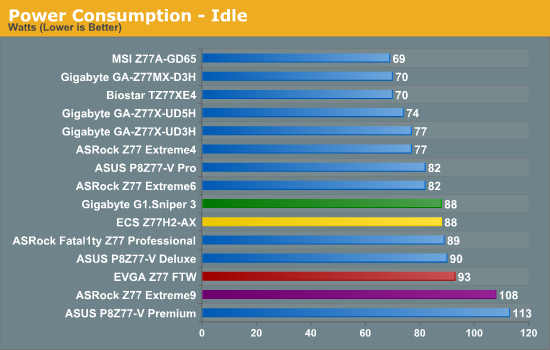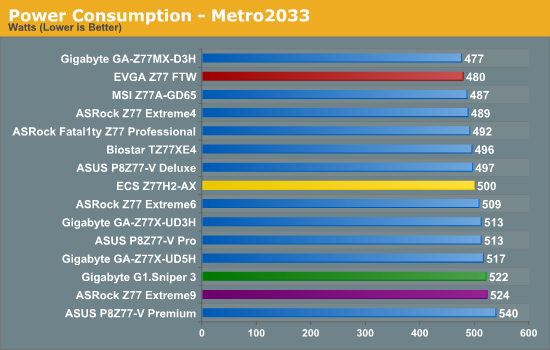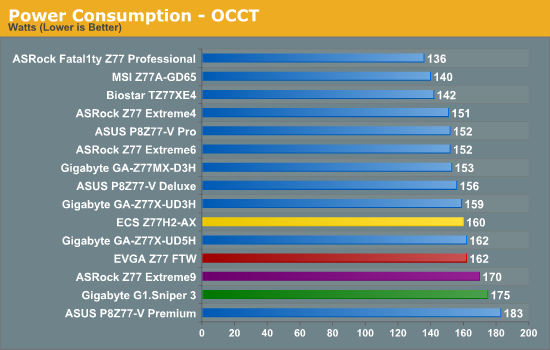Four Multi-GPU Z77 Boards from $280-$350 - PLX PEX 8747 featuring Gigabyte, ASRock, ECS and EVGA
by Ian Cutress on August 22, 2012 9:15 AM ESTMany thanks to...
We must thank the following companies for kindly donating hardware for our test bed:
OCZ for donating the Power Supply and USB testing SSD
Micron for donating our SATA testing SSD
G.Skill for donating our memory kits
ASUS for donating AMD GPUs and some IO Testing kit
ECS for donating NVIDIA GPUs
Test Setup
| Processor |
Intel Core i7-3770K ES 4 Cores, 8 Threads, 3.5 GHz (3.9 GHz Turbo) |
| Motherboards |
ASRock Z77 Extreme4 ASRock Z77 Extreme6 ASRock Z77 Extreme9 ASRock Fatal1ty Z77 Professional ASUS P8Z77-V Pro ASUS P8Z77-V Deluxe ASUS P8Z77-V Premium Biostar TZ77XE4 ECS Z77H2-AX EVGA Z77 FTW Gigabyte GA-Z77X-UD3H Gigabyte GA-Z77X-UD5H Gigabyte GA-Z77MX-D3H Gigabyte G1.Sniper 3 MSI Z77A-GD65 |
| Memory | G.Skill F3-19200CL9Q-16GBZMD |
| Power Supply | OCZ 1250W Gold ZX Series |
| Cooling | Intel All-in-One Liquid Cooler |
| Hard Drive | Micron RealSSD C300 256GB |
| Optical Drive | LG GH22NS50 |
| Case | Open Test Bed - CoolerMaster Lab V1.0 |
| Operating System | Windows 7 64-bit |
| SATA Testing | Micron RealSSD C300 256GB |
| Thunderbolt Testing | LaCie Little Big 240GB |
| USB 2/3 Testing | OCZ Vertex 3 240GB with SATA->USB Adaptor |
Power Consumption
Power consumption was tested on the system as a whole with a wall meter connected to the OCZ 1250W power supply, while in a dual 7970 GPU configuration. This power supply is Gold rated, and as I am in the UK on a 230-240 V supply, leads to ~75% efficiency > 50W, and 90%+ efficiency at 250W, which is suitable for both idle and multi-GPU loading. This method of power reading allows us to compare the power management of the UEFI and the board to supply components with power under load, and includes typical PSU losses due to efficiency. These are the real world values that consumers may expect from a typical system (minus the monitor) using this motherboard.



As a general rule, we see that the PLX 8747 motherboards consumer more power in most scenarios. The only exception to this is the EVGA Z77 FTW under Metro2033, which comes in at 480 W compared to the ASRock Z77 Extreme9 at 524 W.










24 Comments
View All Comments
goinginstyle - Thursday, August 23, 2012 - link
I tried the G1 Sniper 3 and returned it a few days later. The audio was a significant downgrade from the Assassin series, EFI is clunky at best and the board had serious problems with a GSKill 16GB 2666 kit, not to mention the lousy fan controls.Purchased a Maximus Formula V and never looked back as the EFI, Fan Controls, Clocking and Audio are much better in every way compared to the Sniper board. There is no way Gigabyte has brought better value than ASUS with the Z77 chipset. You get what you pay for and the GB is overpriced once you actually use the board and compare it to ASUS or even ASRock.
JohnBS - Thursday, November 1, 2012 - link
I am looking for a rock solid MB, so of course I turned to ASUS. However, the reviews from verified buyers showed multiple issues with 3.0 USB ports losing power, system instability after months of use, and multiple instances of the board not working in one or more memory slots. Bent pins from the factory and complete DOA issues as well. A few reports of complete failure when the Wi-Fi card was inserted, yet gone with the card removed. This was mainly the Maximus IV series. Then I thought I'd look into the Maximus V series, because I really wanted ASUS, and was kinda sad to read reviews. Same issues from verified buyers of the Maximus V, more so with the USB 3.0 problems and the Wi-Fi/Bluetooth add-on card failures. In common were multiple complaints about customer service.So I emailed the ASUS rep who was replying to everyone's post, with specific attention on the recurring problems and how I was concerned about buying a MB. I got the email back, stating they were aware of the recurring problems listed on the user reviews, but that they are isolated occurrences.
I really need a rock solid x16 x 2 pci-e mb right now, and that's why I'm still searching. I'm planning on overclocking an i7-2700k with an gtx 690 and a 120z monitor for high res gaming. The sniper 3 looks good, but the front audio plug reaching the board's bottom audio header might be something I can't work around.
Just want something reliable. If there's a known issue, I'm always in that percentile that gets hit with the RMA process. I'm trying so hard to avoid that.
(Went with 690 instead of dual 680 for heat, noise, power draw considerations).
jonjonjonj - Friday, October 26, 2012 - link
you mean gigabyte in the evga conclusion?"the EVGA does not keep pace with ASUS and EVGA even at stock speeds."
couchassault9001 - Friday, November 2, 2012 - link
So for gaming benchmarks is it correct that the cpu multipliers were at 40 on the g1.sniper and 36 on the evga? if so it seems to be a rather unfair comparison. Being that the sniper cpu is running 11% fasterI'd be amazed if someone was looking at these boards with no intent to overclock like crazy, as i'm trying to decide between these 2 boards myself, and i'm sure i'll be pushing my 3770k as far as it will go.
The evga consumed ~8% less power than the sniper under load.
dirt 3 showed a 9% frame rate drop in the frame rate going from g1 to evga. metro 2033 showed a 3.6% drop in frame rate going from g1 to evga. Both of these are on the 4 7970 benchmarks. the 3 and below the gap is much tighter with it being under 1% with one card.
I know this may be nit picking to some, but i plan on running 5760x1080 3d so 4 7970 performance on a i7-3770k is exactly what i'm looking at.